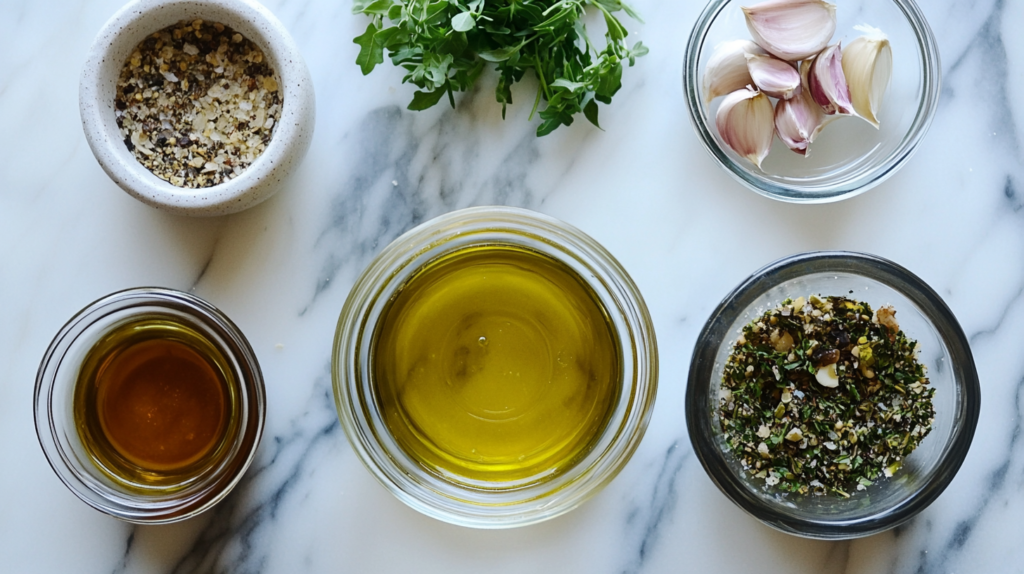Greek salad dressing is a cornerstone of Mediterranean cuisine, known for its bold, tangy flavors and versatility. It’s a simple yet powerful dressing that can elevate a wide range of dishes, from a classic Greek salad to grilled meats, roasted vegetables, and even as a marinade. This guide will walk you through the details of making a perfect Greek salad dressing, covering everything from the key ingredients to tips, variations, and how to store it. Let’s dive in!
Introduction to Greek Salad Dressing
Greek salad dressing, also known as “Greek vinaigrette,” is typically made from a combination of olive oil, vinegar, lemon juice, garlic, and herbs. It’s a simple yet flavorful dressing that can turn any ordinary salad into an extraordinary meal. The key to its authenticity lies in the use of high-quality ingredients such as extra virgin olive oil, red wine vinegar, and fresh lemon juice. This dressing is both tangy and savory, with the oregano adding an aromatic depth that is unmistakably Mediterranean.
The History of Greek Salad Dressing
The origins of Greek salad dressing can be traced to traditional Greek cuisine, which has been influenced by Mediterranean agriculture and culture for thousands of years. Olive oil, vinegar, lemon, and herbs like oregano are staples in Greek cooking, making dressing not only a flavorful addition but also an integral part of their culinary heritage. This dressing has evolved into a popular choice worldwide for salads, marinades, and even as a dip.
Greek salads are believed to have originated from ancient Greek culture, where vegetables, herbs, and olive oil were the foundation of meals. The incorporation of olives and feta cheese brought a savory, rich element to the dish. Over time, various versions of Greek salad dressing appeared, but the combination of olive oil, vinegar, lemon, garlic, and oregano remains the most popular.
Why You Should Make Your Own Greek Salad Dressing
While store-bought versions are convenient, homemade Greek salad dressing offers several advantages. First, it’s far fresher, allowing you to enjoy the full vibrancy of the ingredients. Second, it’s customizable; you can tweak the proportions of oil, vinegar, or seasoning to match your exact taste preferences. Finally, homemade dressing is free from the preservatives and added sugars often found in store-bought varieties, making it a healthier option.
Making your own dressing also allows you to control the quality of the ingredients. If you choose organic, cold-pressed extra virgin olive oil, high-quality vinegar, and fresh lemon juice, you’re assured that your dressing will be of the highest standard, benefiting both your taste buds and health.

Essential Ingredients in Greek Salad Dressing
To create the best Greek salad dressing, it’s crucial to use high-quality ingredients that complement each other. Let’s take a closer look at each of these ingredients and their role in the dressing.
Extra Virgin Olive Oil
Extra virgin olive oil is the foundation of Greek salad dressing. It’s known for its rich, fruity flavor and health benefits, being packed with heart-healthy monounsaturated fats. The best olive oils will have a robust flavor that enhances the dressing. The oil helps to balance the acidity from the vinegar and lemon juice, giving the dressing a smooth and silky texture.
Olive oil is integral to the Mediterranean diet, which is widely regarded as one of the healthiest diets in the world. The antioxidants and healthy fats in olive oil contribute to a lower risk of heart disease and promote overall well-being. Choosing high-quality extra virgin olive oil is important because it has the most flavor and the most health benefits.
Red Wine Vinegar
Red wine vinegar brings acidity to the dressing, which is essential for balancing the richness of the olive oil. It has a tangy, sharp flavor that’s not overpowering, making it the perfect vinegar for dressing. Some recipes may call for other types of vinegar, but red wine vinegar is the traditional choice in Greek cuisine.
The acidity of red wine vinegar helps to cut through the oil, creating a perfect balance of flavors. Additionally, red wine vinegar pairs perfectly with other Greek ingredients like feta cheese, olives, and tomatoes, enhancing the overall flavor of the dressing.
Lemon Juice
Lemon juice adds a fresh, citrusy zing that brightens the dressing. It complements the tanginess of the vinegar and adds a natural sweetness that helps to round out the overall flavor profile. Freshly squeezed lemon juice is ideal, as it provides a much more vibrant flavor than bottled lemon juice.
The high acidity of lemon juice works alongside vinegar to give the dressing its sharpness while also adding a refreshing burst of citrus. Additionally, the vitamin C found in lemons has numerous health benefits, including immune support and improved skin health.
Garlic
Garlic adds depth and a mild spiciness to the dressing. It’s essential for that savory, aromatic quality that makes Greek salad dressing so unique. Minced garlic is commonly used, but you can also use garlic powder if you prefer a more subtle flavor.
Garlic is not only flavorful but also packed with health benefits. It’s known to have anti-inflammatory properties, boost the immune system, and even reduce blood pressure. Adding garlic to your dressing not only enhances the taste but also gives it a nutritional boost.
Dried Oregano
Oregano is the herb most associated with Greek cuisine. Its earthy, slightly bitter flavor pairs perfectly with the oil and vinegar, creating the quintessential flavor of Greek dressing. Dried oregano is typically used because of its more concentrated flavor compared to fresh oregano.
Oregano is rich in antioxidants and contains compounds that have anti-inflammatory properties. It also has a distinct flavor that enhances the overall taste of the dressing, making it truly authentic and unmistakably Greek.
Dijon Mustard
Dijon mustard is often included in Greek salad dressing recipes, though it’s not strictly necessary. It acts as an emulsifier, helping the oil and vinegar mix together more smoothly. The mustard also contributes a mild tangy flavor that enhances the overall dressing.
The mustard seeds used in Dijon mustard contain antioxidants and beneficial oils that promote good digestion and contribute to heart health. It’s a simple yet effective addition to the dressing, both for texture and flavor.
Salt and Pepper
Salt and pepper are added to taste. The salt helps to bring out the flavors of the other ingredients, while black pepper adds a subtle spiciness. You can adjust the seasoning to suit your preference, but don’t skip the salt, as it’s essential for a well-balanced dressing.
Salt not only enhances the flavor but also helps preserve the freshness of the dressing. Pepper adds a gentle heat and aromatic quality, making the dressing more complex and rounded.
Honey or Maple Syrup (Optional)
Some people like to add a teaspoon of honey or maple syrup to their dressing. This optional ingredient helps to mellow out the acidity of the vinegar and lemon juice, providing a bit of sweetness that can balance the overall flavor. This is particularly useful if you have a sweet tooth or prefer a dressing that’s less tangy.
Honey, especially raw honey, has several health benefits, including its antimicrobial properties and ability to soothe digestive issues. Maple syrup is a plant-based alternative that adds its own unique flavor profile and is also a healthier sweetener option.

How to Make Greek Salad Dressing
Now that we’ve covered the ingredients, let’s move on to how to make the dressing itself. Don’t worry – it’s incredibly simple and only takes a few minutes to whip up.
Step-by-Step Instructions
- Combine the Oil and Vinegar:
Start by combining the extra virgin olive oil and red wine vinegar in a small bowl or jar. The ratio should be about 3:1, with three parts olive oil to one part vinegar. This creates a balanced dressing that’s not too acidic. - Add the Lemon Juice:
Next, add the freshly squeezed lemon juice to the oil and vinegar mixture. This will brighten up the flavor of the dressing and enhance the tanginess. - Mix in the Garlic and Mustard:
Add the minced garlic and Dijon mustard to the mixture. These ingredients will add depth and help emulsify the dressing, so it stays smooth and doesn’t separate. - Season with Oregano, Salt, and Pepper:
Stir in the dried oregano, salt, and black pepper. Taste the dressing as you go, adjusting the seasoning to your liking. - Optional Sweetener:
If you prefer a slightly sweeter dressing, you can add honey or maple syrup. Stir it in until it’s fully dissolved and incorporated into the dressing. - Whisk or Shake to Combine:
Whisk everything together in a bowl until it’s fully emulsified. Alternatively, you can add all the ingredients to a jar with a tight-fitting lid and shake it vigorously to combine. - Taste and Adjust:
Taste the dressing and adjust any of the ingredients as needed. If you like a tangier dressing, add more vinegar or lemon juice. If you prefer it milder, add a bit more olive oil. - Serve or Store:
The dressing is now ready to serve! Drizzle it over your Greek salad or store it in the fridge for later use. If storing, give it a good shake or stir before each use.
Using Greek Salad Dressing
1.
The most classic use of Greek salad dressing is, of course, over a fresh Greek salad. A traditional Greek salad includes cucumbers, tomatoes, red onions, Kalamata olives, and feta cheese. Toss these ingredients with your homemade Greek dressing for an authentic Mediterranean dish that’s bursting with flavor.
2. Grilled Vegetables
Greek salad dressing is also excellent as a marinade for grilled vegetables. Vegetables like zucchini, eggplant, bell peppers, and mushrooms absorb the flavors of the dressing and develop a rich, smoky taste when grilled. Simply toss the veggies in the dressing and let them marinate for about 30 minutes before grilling.
3. Roasted Potatoes
For a Mediterranean twist on roasted potatoes, use Greek salad dressing instead of your usual olive oil and seasoning. The tangy, herby flavors of the dressing pair beautifully with crispy roasted potatoes, making them extra delicious.
4. As a Marinade for Chicken or Fish
Greek salad dressing works wonders as a marinade for chicken or fish. Its acidity helps tenderize the meat, while the garlic, oregano, and lemon infuse it with rich Mediterranean flavors. Marinate your protein of choice for at least 30 minutes before grilling, roasting, or pan-searing.
Customizing Your Greek Salad Dressing
While the traditional Greek salad dressing recipe is a winner on its own, there are plenty of ways to customize it to suit your tastes.
Add Fresh Herbs
For a more vibrant and fresh flavor, consider adding fresh herbs to your dressing. Fresh parsley, dill, or basil can complement the oregano and give your dressing a more complex, herby profile.
Experiment with Different Vinegars
Though red wine vinegar is the classic choice, you can experiment with other types of vinegar. Balsamic vinegar will add a sweet, tangy element, while white wine vinegar is a bit milder. Apple cider vinegar is another option that brings a fruity undertone to the dressing.
Spice it Up
If you like a bit of heat, add a pinch of red pepper flakes to the dressing. This adds a subtle spiciness that pairs beautifully with the savory ingredients.
Storing Greek Salad Dressing
Greek salad dressing can be made in advance and stored in the fridge for future use. In fact, the flavors tend to develop and improve after a day or two of resting. Here’s how to store it:
How to Store HomemadeSalad Dressing
Store the dressing in an airtight container or jar in the refrigerator. It should last for up to one week. Be sure to shake or stir the dressing well before using, as it may separate after sitting.
Can You Freeze Salad Dressing?
While it’s possible to freeze Greek salad dressing, it’s not recommended. Freezing can cause the olive oil to separate, resulting in a less smooth texture once thawed. It’s best to make smaller batches of dressing that you can use within a week.

Greek Salad Dressing Variations
While the classic Greek salad dressing is already perfect, here are some variations to keep things interesting.
Creamy Greek Salad Dressing
For a creamy version of Greek dressing, add a couple of tablespoons of Greek yogurt to the dressing. This will give it a rich, smooth texture and a tangy flavor that pairs well with salads or as a dip.
Vegan Greek Salad Dressing
To make this dressing vegan, simply omit the honey (or replace it with maple syrup) and ensure that your Dijon mustard is free from animal products. This makes the dressing suitable for those following a plant-based diet.
Spicy Greek Salad Dressing
If you enjoy a spicy kick, add more red pepper flakes or a dash of hot sauce to the dressing. You can also experiment with chili powder or smoked paprika for a different type of heat.
Frequently Asked Questions (FAQs)
1. How long does homemade Greek salad dressing last?
Homemade Greek salad dressing will last for about 5-7 days in the refrigerator when stored in an airtight container.
2. Can I use white wine vinegar instead of red wine vinegar?
Yes, you can substitute white wine vinegar for red wine vinegar, but the flavor will be a little milder.
3. Can I make Greek salad dressing ahead of time?
Yes, Greek salad dressing can be made ahead of time. In fact, it often tastes better after sitting for a few hours or overnight.
4. What can I use Greek salad dressing for besides salads?
You can use Greek salad dressing as a marinade for meats and vegetables, a dipping sauce, or even as a drizzle over roasted potatoes.
5. How can I make Greek salad dressing less tangy?
If you find the dressing too tangy, reduce the amount of vinegar or lemon juice. You can also add a small amount of honey to balance the acidity.
Conclusion
Greek salad dressing is one of the simplest, most versatile dressings you can make. With just a few ingredients, you can transform a basic salad into something extraordinary. Whether you’re drizzling it over vegetables, using it as a marinade, or enjoying it with a classic Greek salad, this dressing will become a staple in your kitchen. Try making your own today, and enjoy the vibrant, fresh flavors of the Mediterranean in every bite.
Table of Contents
Table of Contents

The Ultimate Guide to Making Greek Salad Dressing
A tangy, zesty, and refreshing Greek salad dressing perfect for adding flavor to your salads, vegetables, and even grilled meats.
- Total Time: 5 minutes
- Yield: Makes about 1 cup 1x
Ingredients
- 1/2 cup extra virgin olive oil
- 3 tablespoons red wine vinegar
- 1 tablespoon lemon juice
- 1 teaspoon dried oregano
- 1 garlic clove, minced
- 1 teaspoon Dijon mustard
- Salt and pepper to taste
- 1 tablespoon chopped fresh parsley (optional)
Instructions
- In a small bowl or jar, whisk together the olive oil, red wine vinegar, lemon juice, garlic, Dijon mustard, oregano, salt, and pepper until fully combined.
- Taste and adjust seasoning if necessary, adding more salt, pepper, or lemon juice as desired.
- If using, stir in the chopped parsley for a fresh, vibrant touch.
- Pour over your favorite Greek salad, or store in an airtight container in the fridge for up to a week.
Notes
This dressing can be made ahead of time and stored in the refrigerator. It may separate, so just give it a good shake or stir before using.
- Prep Time: 5 minutes
- Cook Time: 0 minutes
- Category: Dressing
- Method: Mixing
- Cuisine: Greek
Nutrition
- Serving Size: 1 tablespoon
- Calories: 70
- Sugar: 0g
- Sodium: 180mg
- Fat: 7g
- Saturated Fat: 1g
- Unsaturated Fat: 6g
- Trans Fat: 0g
- Carbohydrates: 1g
- Fiber: 0g
- Protein: 0g
- Cholesterol: 0mg
Keywords: Greek salad dressing, olive oil, vinegar, oregano, lemon juice



